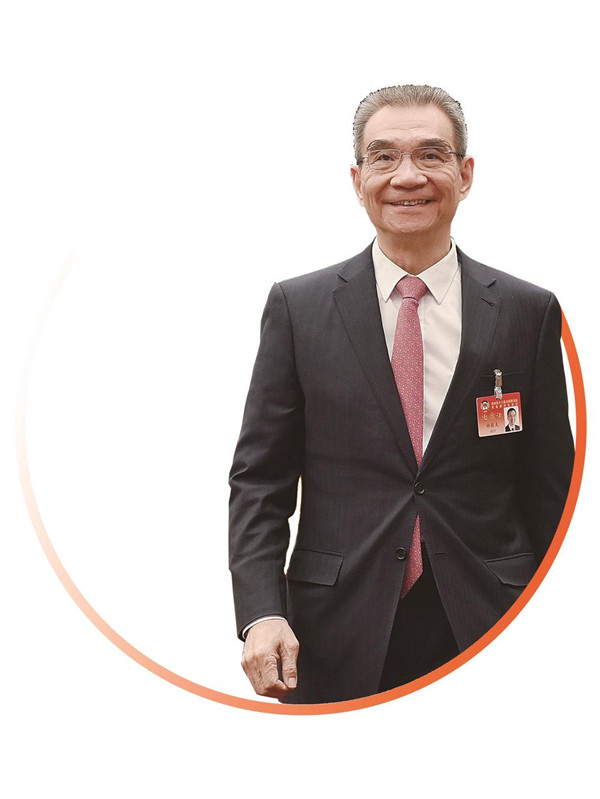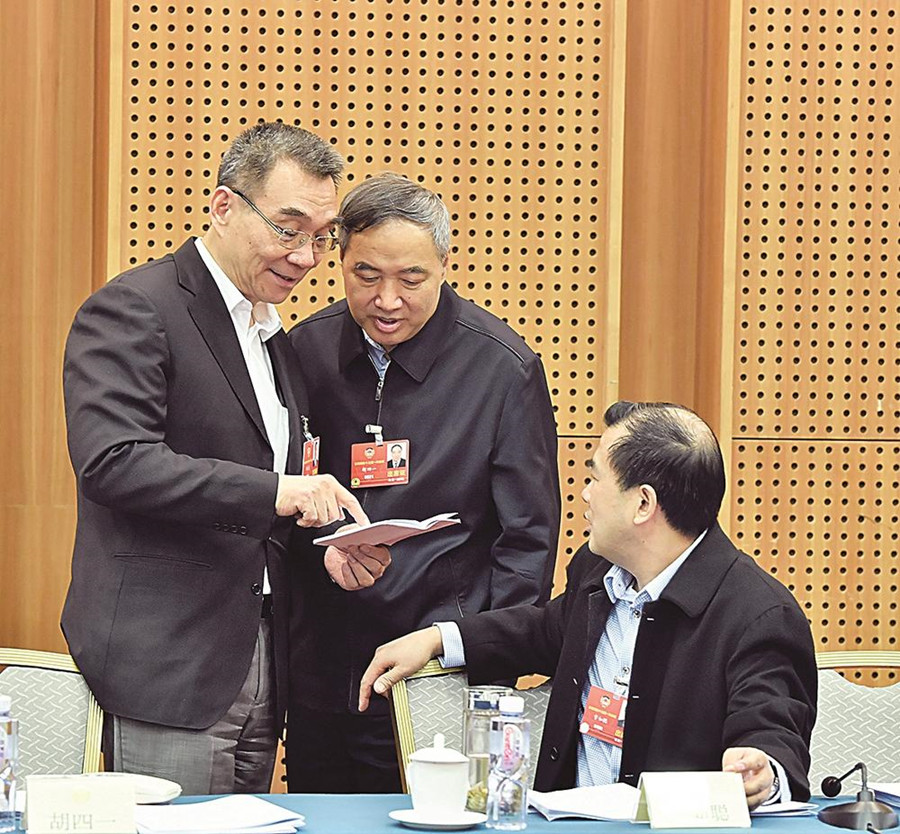Justin Yifu Lin: Contributing knowledge and insights to the country

Justin Yifu Lin is a member of the Standing Committee of the Chinese People's Political Consultative Conference (CPPCC) National Committee, vice-chairman of the Committee on Economic Affairs of the CPPCC National Committee, a counselor with the State Council, and dean of the Institute of New Structural Economics at Peking University. [Photo provided to cppcc.gov.cn]

(L-R) CPPCC National Committee members Justin Yifu Lin, Hu Siyi, Yu Rucong exchange views during the first session of the 13th CPPCC National Committee in 2018. [Photo provided to cppcc.gov.cn]
Taking the mission of serving the country and the world as his own responsibility, Justin Yifu Lin, a member of the Standing Committee of the Chinese People's Political Consultative Conference (CPPCC) National Committee, vice-chairman of the Committee on Economic Affairs of the CPPCC National Committee, a counselor with the State Council, as well as dean and professor of the Institute of New Structural Economics at Peking University, has achieved excellence in every identity of his career.
For his outstanding contribution as a member of the CPPCC National Committee, Lin was awarded the 2022 excellent performance award of CPPCC National Committee members in January.
Embarking on his road of economic research from studying China's agricultural problems, Lin is known as an agricultural economist and has a strong natural complex for sannong - an official term referring to agriculture, rural areas and farmers.
His early work Institution, Technology and China's Agricultural Development, published in 1992, was awarded the Sun Yefang Economic Science Award - China's highest prize in economics, in which he put forward a series of policy recommendations on the country's agricultural reform and rural development.
"The vast majority of China's poverty-stricken people live in rural areas, is the most critical issue of concern in the country's modernization drive. If we can solve the problems in rural areas, won't we will solve the problem of poverty in China? If we can solve poverty in China, that also mean alleviation of more than half of the poverty in the world," said Lin, who is also president of the Institute of South-South Cooperation and Development and honorary dean of the National School of Development at Peking University.
At the Forum on the Outlook for the 21st Century held by the CPPCC National Committee in September 1996, which was also attended by representatives from 18 countries in the Asia-Pacific and Europe, Lin refuted the fallacy of "who will feed China" from Lester R. Brown, founder of the Worldwatch Institute based in Washington DC, pointing out that Brown's prediction ignored China's potential in using modern science and technology to increase grain output, as well as the leading position of the country's agricultural scientific research in the world and the Chinese government's policies supporting grain production.
To cope with the serious domestic problems of deflation, industrial overcapacity, declining employment opportunities, and falling income, Lin put forward the concept of "new rural movement" in 1999, highlighting the construction of networks for water supply, electrification and road transportation in rural areas across the country.
He suggested that the central government accelerate the construction of infrastructure for daily life and consumption in rural areas, and open the vast rural market to absorb overcapacity, and thus, "killing two birds with one stone," further narrowing the gap between urban and rural areas in China.
For five consecutive years since 2015, Lin conducted field research around Hotan prefecture, the main battlefield of poverty alleviation in Northwest China's Xinjiang Uygur autonomous region.
Based on his work in Xinjiang, he made a number of suggestions, such as attracting and transferring labor-intensive industries from China's eastern areas to western regions; carrying out poverty alleviation by developing clusters of characteristic industries; promoting projects with low investment and quick returns, including the processing of agricultural products and production of handicrafts; and launching processing businesses with supplied materials to help in the self-development of the local people; and introducing preferential policies to attract investment from enterprises that would otherwise transfer their projects to overseas areas.
Lin's efforts in promoting local manufacturing industries helped create nearly 100,000 new jobs in Hotan, an incredible feat and contribution to the region's fight against poverty.
From 2014 to 2022, Lin also paid consistent attention to the development of small and medium-sized enterprises (SMEs) in China. In his opinion, the sound development of SMEs is an important guarantee for achieving common prosperity.
In the past year, in addition to a busy schedule of conferences, research and teaching work, Lin also offered new suggestions through CPPCC platforms, on issues concerning green, low-carbon and high-quality social and economic development and the promotion of common prosperity, priority policies boosting employment, enhancing the sense of responsibility and mission of CPPCC members, and further improving the ability of CPPCC members.
"The CPPCC consultation platforms provide an effective mechanism for CPPCC members to make suggestions. As a CPPCC member, it is the greatest reward for us to have such an opportunity to give full play to what we have learned and contribute our wisdom to the Party and the country," said Lin, who once served as a chief economist and senior vice-president of the World Bank.
Lin said that he believes that theories from China can not only help solve the country's problems, as a developing country, China's conditions are more similar to those of other developing countries, therefore, Chinese theories provide the world with a "China solution", which can more effectively help developing countries solve their respective problems than the theories from developed countries.
Copyright © The National Committee of the Chinese People's Political Consultative Conference.
All rights reserved. Presented by China Daily.
京ICP备08100501号-1

